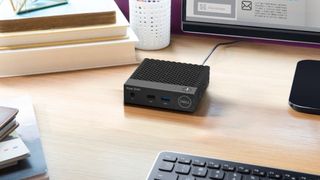Dell launches new Wyse 3040 thin client with matching OS
Wyse 3040 promises strong connectivity, improved performance and business flexibility

Dell has announced a new addition to its thin client portfolio, promising increased power efficiency, versatile connectivity options and a slim, lightweight design.
Designed to offer a cost-effective endpoint solution for virtualised desktop environments, the Dell Wyse 3040 is compatible with Citrix XenDesktop, Microsoft RDS and VMWare Horizon.
A new operating system will ship alongside the Wyse 3040, custom-tailored for use with Dell thin client devices. Wyse ThinOS includes a number of security and management features, Dell's senior vice president and general manager for client solutions, Steve Lalla, toldIT Pro.
"Having a bare-metal OS that is tightly locked-down and managed, we think is increasingly important for those customers who are dealing with the concerns around data leakage or data loss," he said.
Starting in June this year, customers will also have access to ThinLinux, a SUSE Linux-based operating system that has also been enhanced by Dell for secure thin client use.
The Wyse 3040 comes with four USB ports, including one USB 3.0 port for high-speed data transfer and device charging, as well as ethernet support and two DisplayPort interfaces with a maximum resolution of 2560x1600.
It also includes a quad-core Intel Atom X5 1.44GHz processor, supporting up to 2GB of DDR3 memory and 8GB of flash storage. Wireless networking support is set to be added later on in the year.
Get the ITPro. daily newsletter
Receive our latest news, industry updates, featured resources and more. Sign up today to receive our FREE report on AI cyber crime & security - newly updated for 2024.
Thin client solutions can play a pivotal role in creating a flexible, agile workplace, according to Lalla. "We have customers who will set up hundreds of workstations with thin clients, with monitors, and as employees come and go, they actually just sit down at any workstation that's available, and the ability for them to log in and get their personal desktop or their personal app catalogue and do work provides for an incredibly flexible in-office environment," he said.
"To me, the agile workforce is ' I want access to my data wherever I'm at, on whatever tool I'm using'."
He also highlighted the benefits for companies with remote workers. Because thin clients use desktop virtualisation, businesses can safely provision temporary or remote workers with thin client hardware with no fear of data loss, as all the company's sensitive IP remains stored in the data centre.
This ties into another major advantage for CIOs and IT managers, which is that desktop virtualisation can free up huge amounts of IT resources. "[They involve] very lightweight management on the edge," Lalla explained. "There isn't patching, there isn't all the overhead you need to take care of that product, there's a small operating system footprint."
"The other benefit is all of the images, all of the applications and content, are stored centrally, and so as an IT manager, you're managing stuff in the data centre, you're not going to desk-side visits, you're not handling calls because of a security issue, or 'oh, my system isn't working'."
Dell highlighted a use case that might be particularly relevant for UK CIOs, and that is GDPR. The new legislation is going to force companies to keep much tighter control over the information they hold. Dell believes the ability to centralise data, as well as to keep tabs on where, when and by whom your data is being accessed, will be key drivers for the uptake of thin client operating systems.
The Wyse 3040 is available now, starting at 259.99.
Picture: Dell
Dell acquires thin client giant Wyse Dell Chromebook 13 7310 review General Data Protection Regulation (GDPR)
Adam Shepherd has been a technology journalist since 2015, covering everything from cloud storage and security, to smartphones and servers. Over the course of his career, he’s seen the spread of 5G, the growing ubiquity of wireless devices, and the start of the connected revolution. He’s also been to more trade shows and technology conferences than he cares to count.
Adam is an avid follower of the latest hardware innovations, and he is never happier than when tinkering with complex network configurations, or exploring a new Linux distro. He was also previously a co-host on the ITPro Podcast, where he was often found ranting about his love of strange gadgets, his disdain for Windows Mobile, and everything in between.
You can find Adam tweeting about enterprise technology (or more often bad jokes) @AdamShepherUK.





